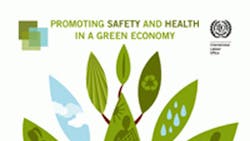The 2012 World Day for Safety and Health at Work focuses on the promotion of occupational safety and health (OSH) in a green economy. There is a shift in the world to a greener and more sustainable economy. However, even if certain jobs are considered “green,” the technologies used may protect the environment but not be safe at all.
As the green economy develops, it is essential that safety and health at work is integrated into green jobs policies. This implies integrating risk assessment and management measures in the life cycle analysis of all green jobs. According to ILO, a true green job must integrate safety and health into design, procurement, operations, maintenance, sourcing and recycling policies, certification systems and occupational safety and health quality standards. This especially is relevant for sectors such as construction, waste recycling, solar energy production and biomass processing.
“Experience has already shown that some substances while being more environmentally friendly could be more hazardous to workers’ health,” Somavia commented. “Consequently, renewable energies, waste management and recycling, as well as the greening of traditional industries, must be approached from the outset with an eye on the occupational safety and health challenges with the aim of eliminating old hazards and risks and preventing new ones from emerging.”
A new report by the ILO launched for World Day for Safety and Health at Work says the greening of the economy should be accompanied by the proper integration of workplace safety and health measures. "Promoting Safety and Health in a Green Economy"looks at different “green industries” from an occupational safety and health perspective, and shows that while green jobs improve the environment, revitalize the economy and create new employment opportunities, they may also present a number of known and unknown risks for workers.
Rio +20 Summit
The Rio +20 Summit, the United Nations Conference on Sustainable Development scheduled for Rio de Janeiro in June, will address the challenge of ensuring that sustainable development is built on economic growth and social equity as well as environmental protection.
“Realizing this vision of sustainable development requires integrated and mutually reinforcing policy approaches bringing together the needs of people and the planet, linking growth and fairness,” said Somavia.
At the Rio+20 Conference, world leaders, along with thousands of participants from governments, the private sector, NGOs and other groups, will come together to shape how the world can reduce poverty, advance social equity and ensure environmental protection on an ever more crowded planet.
Twenty years after the 1992 Earth Summit in Rio, where countries adopted Agenda 21 - a blueprint to rethink economic growth, advance social equity and ensure environmental protection - the UN is bringing together governments, international institutions and major groups to agree on a range of smart measures that can reduce poverty while promoting decent jobs, clean energy and a more sustainable and fair use of resources.
“Let us make the safety and health of all workers – in the formal and informal economy – a primary and direct objective of policies and strategies for an environmentally sustainable and socially inclusive green economy,” said Somavia. “Let us opt for the approach that produces safe and healthy work in sustainable enterprises, poverty reduction and a growth path that yields more and better jobs.”
About the Author

Sandy Smith
Sandy Smith is the former content director of EHS Today, and is currently the EHSQ content & community lead at Intelex Technologies Inc. She has written about occupational safety and health and environmental issues since 1990.
